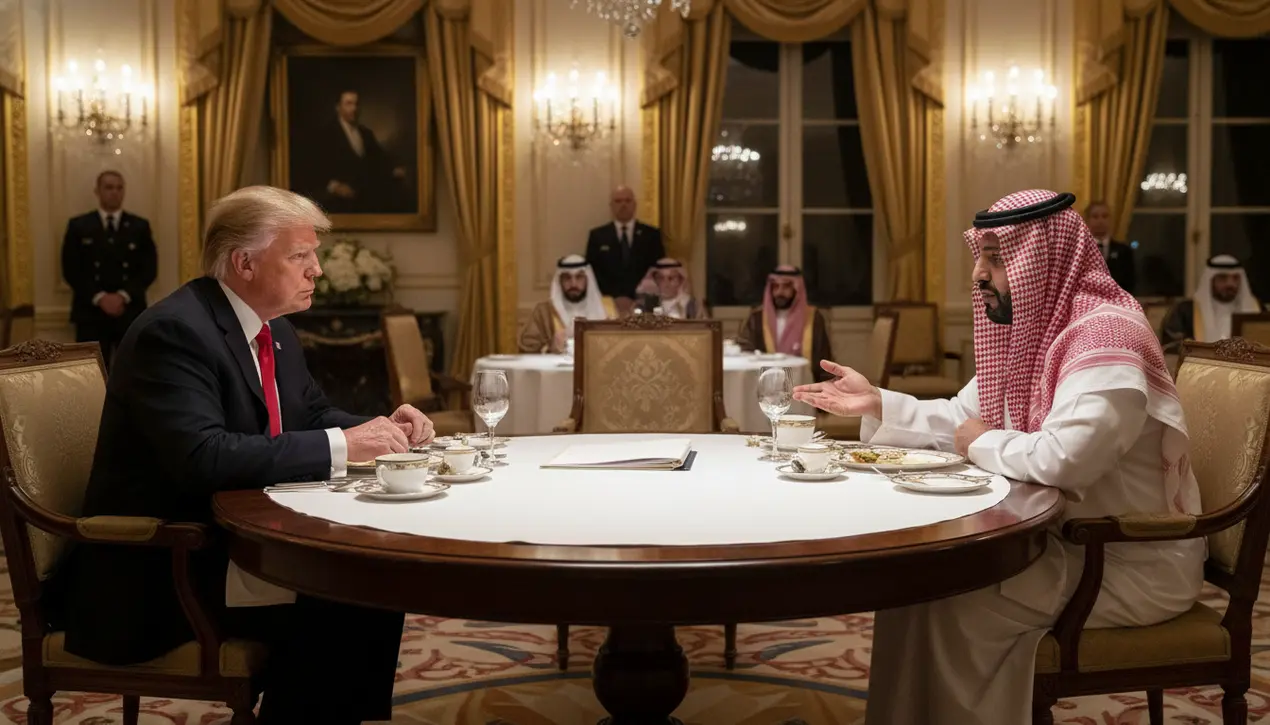
Politicsconflict & defenseArms Deals
Trump designates Saudi Arabia as major non-NATO ally.
MA
Mark Johnson
2 hours ago7 min read2 comments
In a strategic power play that reshapes the geopolitical chessboard, President Trump has formally designated Saudi Arabia as a major non-NATO ally, a move announced during a Tuesday evening dinner with Crown Prince Mohammed bin Salman that dramatically deepens the military alliance between Washington and Riyadh. This isn't just a diplomatic formality; it's a full-scale political offensive, a masterstroke in Trump's campaign to realign America's global partnerships away from traditional European allies and towards energy-rich Gulf powerhouses.The announcement, delivered with Trump's signature flair for theatrical reveals—'I'm just telling you now for the first time, because I wanted to keep a little secret for tonight'—serves as the capstone to a day of high-stakes dealmaking. Earlier, MBS had pledged to turbocharge Saudi investments in the U.S. , catapulting them from an already staggering $600 billion to a monumental $1 trillion, a financial injection that frames the new military status as a reciprocal reward.The strategic defense agreement signed behind closed doors is the real trophy, a binding pact that streamlines defense trade, grants Saudi Arabia privileged access to American military technology, and positions the Kingdom as a central pillar in a new Middle Eastern security architecture conceived in Washington. This was immediately underscored by the earlier revelation that the U.S. will sell F-35 fighter jets to the Saudis, making them the first Middle Eastern nation besides the staunchly defended Israel to obtain these fifth-generation aircraft—a decision that sends shockwaves through the region, particularly to Iran and Qatar, and fundamentally alters the regional balance of power.The timing is impeccable, coming just after Trump's Oval Office meeting with MBS, where the shadow of journalist Jamal Khashoggi's brutal murder was conspicuously dismissed by the President with a casual 'a lot of people didn't like him,' effectively sidelining a major human rights concern in favor of realpolitik and arms deals. This new status, placing Saudi Arabia in an elite club that includes allies like Australia, Japan, and Israel, is a calculated bet on Riyadh as a bulwark against Tehran and a stable partner in a volatile region.But the gambit is not without its political risks and strategic blowback. Critics on Capitol Hill are already mobilizing, arguing that this move emboldens an authoritarian regime, undermines long-standing alliances with NATO partners who may view this Gulf pivot with suspicion, and potentially ignites a new arms race in a tinderbox region.Furthermore, the White House's additional note that Saudi Arabia is seeking to purchase nearly 300 U. S.Abrams tanks illustrates the sheer scale of the military modernization now underway, a boon for the American defense industry but a potential nightmare for non-proliferation advocates. The long-term consequences are profound: this solidifies a U.S. -Saudi axis that is less dependent on oil and more focused on integrated defense and counter-terrorism, yet it also tethers American foreign policy to the ambitious and often controversial vision of Crown Prince Mohammed bin Salman. In the grand theater of global politics, Trump has just handed a leading role to the Saudi crown prince, and the world is watching to see how this high-reward, high-risk alliance will play out on a stage fraught with conflict and competition.
#featured
#Donald Trump
#Saudi Arabia
#Major Non-NATO Ally
#F-35 Jets
#Arms Deal
#Defense Pact
Stay Informed. Act Smarter.
Get weekly highlights, major headlines, and expert insights — then put your knowledge to work in our live prediction markets.
Comments
Loading comments...
© 2025 Outpoll Service LTD. All rights reserved.